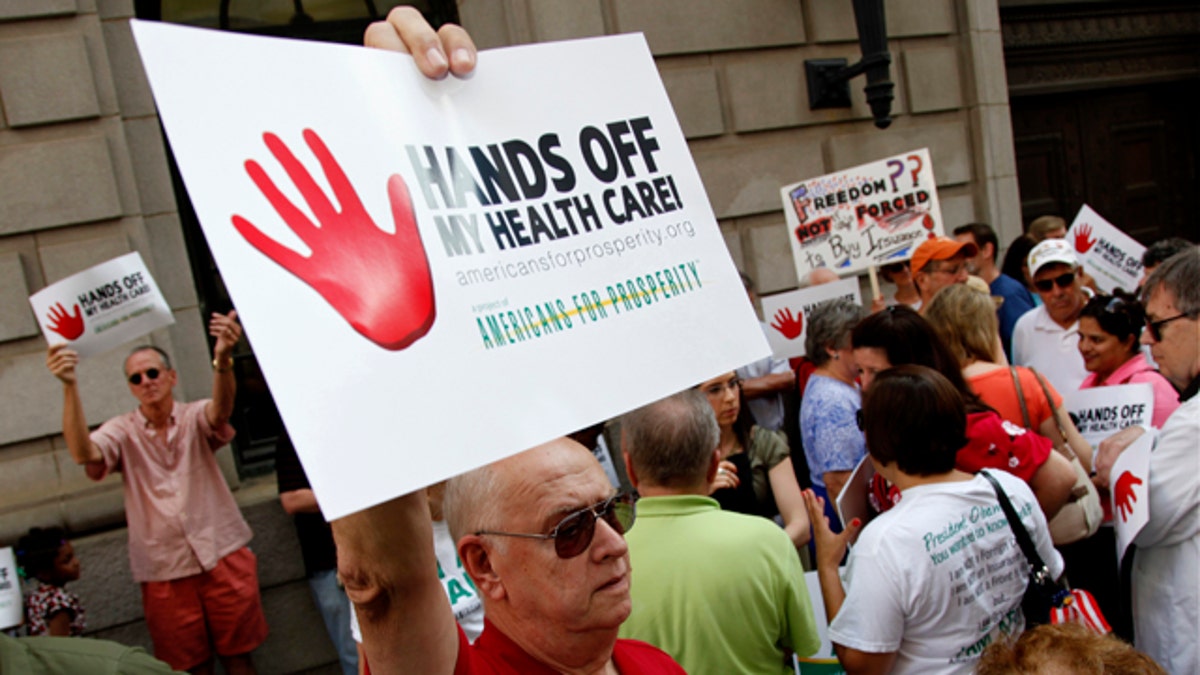
June 8: Mike Griffith, of Canton, Ga., holds a sign during a protest against President Barack Obama's health care reform plan outside the 11th Circuit Court of Appeals in Atlanta. A three-judge panel of the 11th Circuit Court of Appeals was hearing arguments on whether to reverse a Florida judge's ruling that struck down the law. (AP)
ATLANTA, Ga. – The public policy and legal fight over the legitimacy of President Obama’s historic 2010 health care overhaul took sharp focus in an ornate federal courtroom in Atlanta on Wednesday with two-and-a-half hours of arguments that may ultimately serve as a preview of what’s to come at the Supreme Court.
The Obama administration was faced with the difficult task of convincing at least two of the three federal judges hearing an appeal to overturn a January ruling invalidating the entire heath care law.
“Clearly, we believe the most difficult issue in the case is the individual mandate,” Eleventh Circuit U.S. Court of Appeals Judge Joel Dubina announced at the outset. Indeed, most of the argument time focused on whether the law’s requirement for nearly all Americans to purchase health insurance is constitutional.
Dubina also noted that part of the difficulty of determining the legal viability of the Affordable Care Act is that the Supreme Court has never issued a ruling on the application of the Commerce Clause that directly matches up with what Congress passed last year.
“If we uphold the individual mandate in this case, are there any limits on Congress’s power left?" Dubina asked.
Judge Frank Hull later asked whether Congress could pass a similar law which could require Americans to buy certain types of cars or solar panels to comply with federal energy policy. Her question encapsulated the fear shared by many: that if the law is upheld it will open the door to unprecedented federal intervention in people’s lives.
But, Acting Solicitor General Neal Katyal said, “Absolutely not.”
The Obama administration’s chief legal advocate defended the law and said there is no chance for a slippery slope towards increased government regulation. He vigorously argued the law’s propriety and purpose: to make sure uninsured Americans have coverage and that insurance companies offer broader protections.
Judge Stanley Marcus offered his own hypothetical scenario, trying to find out if the government could force Americans to buy a coverage plan for long-term health care. Again, Katyal said that was a step too far from what Congress could do.
The law’s opponents already believe Washington lawmakers went too far in passing the legislation. “If you give Congress the power to regulate people who are not in the relevant market, then you’ve given them the power to literally regulate anything,” warned lawyer Michael Carvin, representing the National Federation of Independent Business, the plaintiffs in the case.
Katyal didn’t take well to his naysayers arguments saying “[T]heir solution is to ban the uninsured from the hospitals and leave bleeding victims, trauma victims and pregnant women at the door.”
For many, the fundamental debate is whether the Commerce Clause, which allows the feds to regulate interstate economic commerce, also allows the government to force people who don’t have health insurance to buy coverage or pay a penalty. In short, it’s a question over whether not having health insurance is an ‘activity’ and whether the government can regulate that decision.
“I would say that sitting in your living room and making an economic decision not to engage in the activity of purchasing health insurance cannot under plain English be economic activity,” said Carvin.
The other key plaintiffs in the case are the 26 states that sued to stop the law from taking effect. They were represented by Bush administration-era Solicitor General Paul Clement. “[The government has] a lot of authority to regulate health insurers and a lot of authority to regulate people who voluntarily purchase health insurance,” Clement said to a question from Judge Marcus. “But I would submit they don’t have the authority to compel people to engage in the transaction.”
At the end of the case, Hull hit upon another controversial matter over the penalty that’s imposed on people who don’t buy insurance. She noted with some derision the government’s enforcement mechanism for collecting fines: essentially trusting that people who don’t comply with the law will tell the truth on their tax returns.
“How is that penalty even more collectible in any way than an unpaid medical bill?” Hull asked.
Five of the plaintiff states’ attorneys general attended the arguments and added another spin on that issue, with Texas Attorney General Greg Abbott telling the media the administration was levying a new tax on Americans; one it never revealed during the health care debate.
The judges also spent time examining whether the individual mandate can be separated from other provisions and if expanding the umbrella of Medicaid eligibility puts too much of a burden on the states.
The judges aren’t expected to issue an opinion until summer’s end. Before departing the courtroom, Judge Dubina offered this prediction about the case ultimately ending up at the Supreme Court, “I doubt this is the last time we’ll be arguing this case.”




